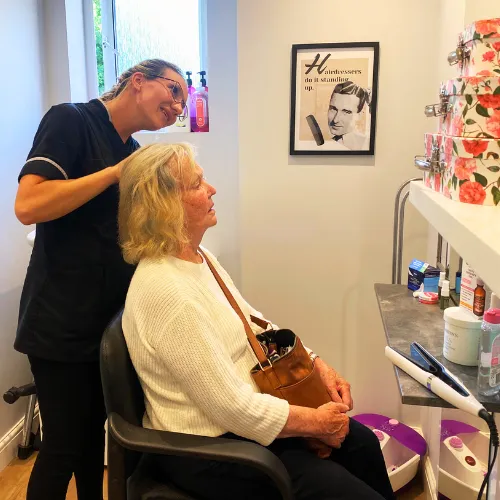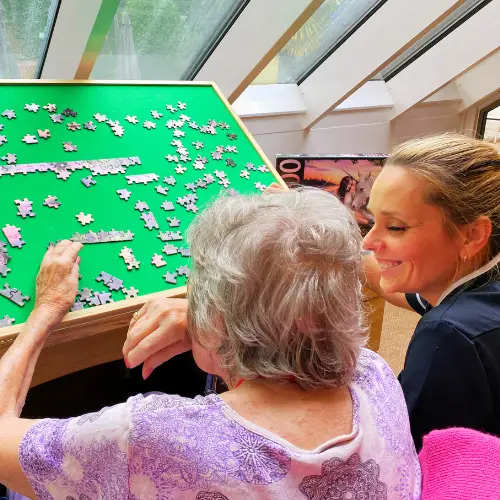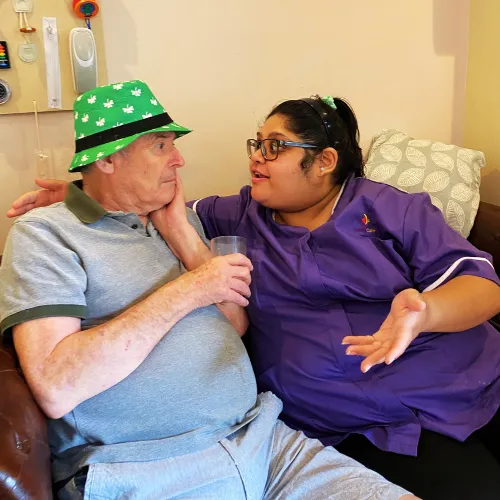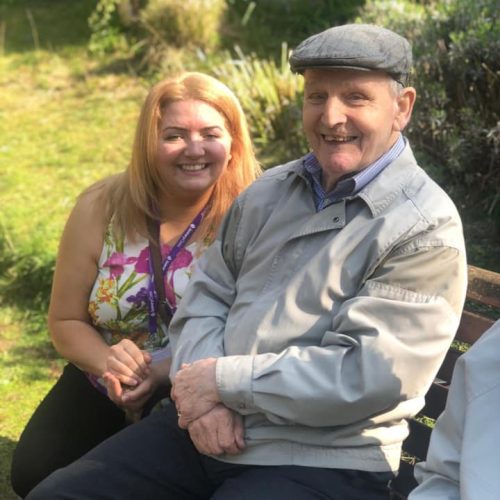Understanding The Types of Dementia and Their Differences

Dementia is a common term, with many people using it as a reference to a loved one’s deteriorating cognitive condition. There is a misconception that dementia is the condition, but this is not technically true. There are several different types of dementia, and each has various symptoms.
Dementia is an umbrella term that refers to a group of symptoms that affect memory and other cognitive functions, such as thinking, and social abilities. While there are many types of dementia, there are four common ones.
At LuxuryCare, we are dementia care specialists, providing medical care, assistance and support to those with any kind of dementia. In this blog, we share details on the four common types of dementia, explaining their symptoms and how they differ from other types.
Alzheimer's Disease
Alzheimer’s Disease is the most common type of dementia in the UK, accounting for 60-80% of cases.
This condition primarily impacts memory and cognitive function, impairing skills such as thinking, decision-making, and even using language.
Symptoms
Early signs of Alzheimer’s often include:
- Memory loss
- Confusion
- Difficulty with problem-solving
- Challenges in completing everyday tasks
As the condition progresses, the symptoms worsen and expand to include:
- Severe memory loss
- Difficulty communicating
- Changes in behaviour
- Changes in personality
- Physical health issues
Differences
One of the biggest differences between this type of dementia and other types is the speed of the progression.
Alzheimer’s is known to progress slowly, with the symptoms gradually worsening over a longer period of time.
Care Needs
There is currently no cure for Alzheimer’s, so care focuses on slowing the progression down as much as possible and managing the symptoms.
A safe environment is needed for anyone living with the condition because this will prevent accidents and injuries. Their memory and judgement will be impaired, which will likely cause decreased spacial awareness, making them more prone to dropping items, burning themselves or falling over. However, maintaining independence is one way to keep symptoms from progressing.
Memory care activities and therapies such as reminiscence therapy are also important parts of Alzheimer’s care as these stimulate the brain work to slow deterioration down.


Vascular Dementia
Vascular dementia is the second most common type of dementia and is probably the one most people are referring to when they use the term “dementia”.
This dementia is caused by reduced blood flow to the brain and often follows a stroke or series of mini-strokes.
Symptoms
Symptoms of vascular dementia include:
- Cognitive impairment
- Confusion
- Trouble with concentration and organisation
- Difficulties with walking and balance
- Emotional instability
- Mood swings
Differences
Aside from the cause of this type of dementia, there are a couple of other differences.
The most noticeable one is that the symptoms can vary depending on the part of the brain that is affected. This makes the progression of the condition hard to plot, as symptoms won’t follow a gradual pattern of decline.
Care Needs
There is no cure for vascular dementia so, similar to Alzheimer’s, care focuses on managing symptoms.
As this type of dementia is linked to blood flow, it is important to manage cardiovascular health, keeping as active as possible. Where needed, include physiotherapy or physical rehabilitation to maintain mobility and flexibility.
Finally, monitoring the heart and brain is important as you want to keep an eye out for further strokes or heart problems that could worsen the symptoms and condition.
Lewy Body Dementia
Lewy Body Dementia (LBD) is characterised by abnormal protein deposits in the brain. These deposits are referred to as Lewy Bodies, hence the name of this type of dementia.
It’s estimated that around 100,000 people in the UK may have Lewy Body Dementia, though many cases are likely undiagnosed.
The protein in the brain affects cognitive abilities, movement and behaviour.
Symptoms
Symptoms for this type of dementia impact more than just cognitive abilities.
This disease can cause:
- Fluctuating cognitive functions
- Visual hallucinations
- REM sleep behaviour disorder
- Tremors
- Muscle stiffness
Differences
Lewy Body Dementia is incredibly different to other forms of the disease because its symptoms are much more varied.
The unique features, such as hallucinations, are uncommon in other types of dementia. LBD can also create severe sensitivity to antipsychotic medications.
Care Needs
LBD also doesn’t have a cure, so care is predominantly pain and symptom management.
However, due to the varied symptoms, this can require specialist and professional help.
Managing sleep disorders will be part of a care plan, as will physio or occupational therapy to reduce the impact of tremors or muscle stiffness.
Additionally, a structured routine will likely help cognitive function.


Frontotemporal Dementia
Frontotemporal Dementia (FTD) primarily affects the frontal and temporal lobes of the brain (as the name might suggest). This often leads to changes in personality, behaviour and language rather than memory.
This is the least common of the main four types of dementia, and it is estimated that around 31,000 to 50,000 people in the UK are living with it.
Symptoms
Similar to Lewy Body Dementia, this form of dementia impacts more than just cognitive function and manifests a few physical symptoms.
- Significant personality changes
- Becoming more impulsive
- Socially inappropriate behaviour
- Language difficulties
- Motor skills may decline
Differences
The biggest difference between FTD and the other types of dementia is that this one tends to be diagnosed at a younger age, often in those between 45-65 years old.
It also progresses more rapidly than Alzheimer’s.
Care Needs
FTD doesn’t have a cure, so similar to the other types of dementia, a care plan is based on symptom management.
Because this disease can have such an impact on behaviour, it is important to have some behavioural management strategies in place.
Also, it is likely that someone living with this dementia will need speech and language therapy to help them continue to communicate.
The care and support extend beyond the person with the diagnosis, as surrounding family members will need emotional support to deal with the personality changes they experience.
Dementia Care with Luxury Care
So, there we have it. A comprehensive guide to the four most common types of dementia in the UK.
As you can see, each type of dementia differs in its symptoms and the care required, making a diagnosis important.
At LuxuryCare, our teams complete comprehensive dementia-specific training. This means that across our care homes in Bournemouth and Poole, we are able to offer quality dementia care for your loved one, no matter which type they have.
We create bespoke care plans, which are dictated by the type of dementia, your loved one’s personal care preferences, their medical history and life story. This enables us to provide custom care that meets their specific needs.
Our team are passionate about making sure your loved one’s dementia doesn’t impact their quality of life, which is why we amend all activities to their abilities and organise inclusive day trips out around the local area.
Finally, we understand that a dementia diagnosis impacts the whole family, so provide support for everyone, not just your loved one in our care.
Interested in exploring our care home for your loved one? We’d love to welcome you and your loved one to show you our facilities, such as our rooms, catering, garden and lifestyle. When you visit, we will also take the opportunity to learn more about you and your loved one so we can explain how we would support and care for you both.
Book a viewing today by calling us on 01202 037373 or completing our online contact form.















